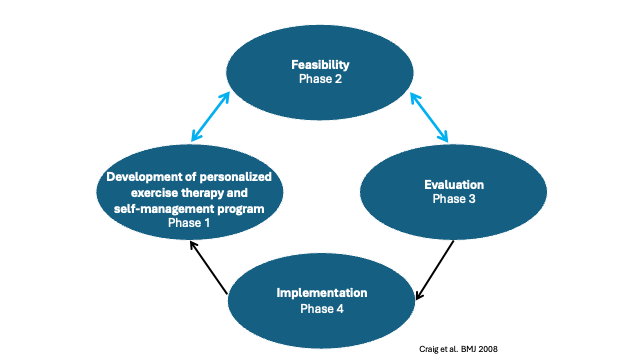Framework of the MOBILIZE project
The MOBILIZE project has been structured into several key phases, as illustrated in Figure 1.
Figure 1 Overall framework for developing and evaluating complex interventions
The MOBILIZE project has been structured into several key phases, as illustrated in Figure 1.
Figure 1 Overall framework for developing and evaluating complex interventions

In the initial phase, we identified the types of exercise and self-management components most effective for individuals living with at least two chronic conditions. This was achieved through:
Based on this evidence, and in close collaboration with patient partners and clinicians, we co-developed a 12-week program grounded in current exercise guidelines and behavior change strategies. We conducted focus group interviews with patients, healthcare professionals, and other stakeholders to refine the program. One of our patient partners also contributed a Patient Voices article, sharing personal insights and experiences.
Following development, we conducted a feasibility study with 20 participants living with multimorbidity. The study used the same procedures and outcome measures as the subsequent randomized controlled trial (RCT), with data collected at baseline and after four months. Insights from this pilot phase informed key adjustments to the program before launching the full-scale RCT.
The primary outcome of the RCT was quality of life, assessed 12 months after enrollment. In addition, a wide range of secondary outcomes were evaluated, including physical function, serious adverse events, physical activity levels, disease burden, symptoms of depression and anxiety, perceived self-efficacy and functional limitations, self-rated health.
A total of 228 participants from the Zealand Region were recruited and randomly assigned to either usual care or the 12-week MOBILIZE program. Data were collected at baseline, after the intervention (approximately four months), and again at 12 months.
The central hypothesis was that the personalized program would lead to greater improvements in quality of life compared to usual care alone.
The findings of the RCT showed that the participants who received the MOBILIZE program experienced a statistically significant improvement in quality of life compared to the control group, which continued with usual care.
The final phase of the MOBILIZE project is now focused on developing a model for implementing the program in routine clinical practice—an effort that is currently underway.